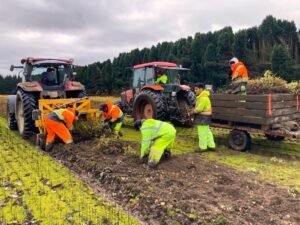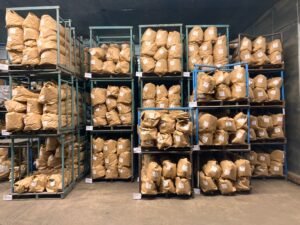PMC Update for December 14, 2023
Here are 5 things that you should know about the PMC for December 14, 2023:
Sales
Sales at the PMC as of December 13 were $1,376,565 which is 81% of the way to meeting the revenue budget for the fiscal year of $1,696,000. That revenue amount to date is a decrease from the same time last year when it was $1,648,946. Part of that decrease can be attributed to a post-COVID bounce last year when planting had increased in part due to making up for lost time during the COVID shutdown. This year’s sales volume is composed of 289 orders which is a slight increase from the same date last year when it was 280 orders. PMC plant sales are divided into $88,427 for contract production which is 5 orders for 125,344 plants, $401,796 to Conservation Districts which is 43 orders for 453,476 plants and $886,341 to other customers which is 241 orders for 714,597 plants. There are still a wide variety of species available so if anyone needs bare root conservation seedlings and live stakes check out the current availability at wacdpmc.org but the list is getting shorter so it is advisable to secure plant materials sooner than later.
Financial Report
As of November 30, 2023 PMC current assets totaled $737,667. These funds are held at Banner Bank in a checking and savings account, as well as at Edward Jones as CD’s and a money market. These funds are separate from the Advisory Solutions portfolio and are earmarked to cover PMC operations during the negative cashflow period through the winter months. They are also meant to cover refunding customer deposits on plants in case the PMC cannot deliver preordered plants.
As mentioned above, cashflow is negative at the PMC during winter months. Expenses increase as harvest begins and revenue does not increase much until larger quantities of plants are shipped and paid for. As of November 30, PMC Net Income was -$368,671 which is comparable to the same time last year when it was -$325,934.
While revenue lags expenses considerably this time of year, the PMC has been shipping and invoicing for live stake orders in October and November. As of November 30, 2023, PMC plant sale revenues fiscal year to date were $88,921, which is down from the same time last year when they were $94,822. Total Revenues for the PMC as of November 30, 2023 were $102,423 which were slightly higher than the same time last year when total revenues were $102,062.

Expenses at the PMC for this fiscal year as of November 30, 2023 were $471,094 which is a decrease from the same time last year when they were $499,987. This decrease was due to paying for some packaging and seed costs during the last fiscal year that are typically paid during the current fiscal year last year to reduce the federal income tax liability last year. There was also a $30,000 reduction in seasonal wages due in part to less weeding needed last summer.
The bottom line is that Net Income for the PMC is a little less negative than the same time last year. This year Net Income was -$368,671 and last year it was -$397,925. That number will become positive by spring when the PMC has harvested and shipped a lot of plants.
Operations

There is only one thing to mention about operations currently and that is that BARE ROOT HARVEST HAS BEGUN!!! It started on December 1st with the full harvest crew. That includes 22 seasonal employees, 6 of which are out with the lifter and 16 in the packing shed sorting, grading, counting, and packaging. There is one additional seasonal employee, Jon, who works diligently building orders and preparing shipping. Crew Leader Maria supervises the packing shed crew and Farm Operations Supervisor Oscar oversees the lifting crew. 19 seasonal employees worked here last year and longer, some have been with us for several years. Having that many returnees makes it easy to get harvest started. The crew has harvested a total of 351,788 plants so far this season with an average of 30,478 plants harvested per day. That is pretty awesome and reflects very well on the crew and staff at the PMC who totally rock!
Coming Attractions, Shipping
As mentioned above, the focus right now is harvest, getting plants out of the field and processed, packaged, and stored. There is not much shipping yet while a variety of plants are rounded up for early orders. By January there will be a lot of orders that will be ready to ship and that will keep our warehouse person quite busy. The most time-consuming part of this process is building the order. That requires going into the cooler, finding the stock

requested, taking out what is needed and putting the rest back, then repeating for every line on each order. Once an order has been pulled it will be held in the cooler awaiting pickup, or packaged for shipping if pickup is not possible. Shipping can take 3 different forms depending upon the size of the order. Smaller orders of a few hundred plants can be boxed up and sent via UPS. Orders of several thousand plants may be palletized and sent on a freight carrier such as Oak Harbor freight. Orders in the tens of thousands may be sent on a large semi-truck. The PMC works with customers to find the best shipping possible. A few things to keep in mind are that sufficient lead time is imperative, an understanding that once it leaves the PMC it is out of our control, and that a viable address to a site able to receive the load is available. In some cases, picking up one’s plants at the PMC can make the process of plant acquisition quicker and easier, plus it is an opportunity to come here and see us.
Assisted Migration

Assisted Migration is the movement of seed and plants beyond their typical range in response to a changing climate. The future climate in the northwestern US is predicted to be warmer and drier in the summer which can be stressful for plants that are genetically predisposed for cooler, wetter summers. It is believed that the same species from populations further south are better adapted for hotter, drier summers. There is an increasing array of studies being undertaken to investigate the feasibility and effects of assisted migration. Hopefully in time the science will be sufficient to provide the basis for new seed transfer zone maps to help guide nurseries and restoration practitioners on where to source seeds for plants going into certain geographic areas. Until then, the PMC propagates plants from source identified seeds which means that it knows where its seeds come from. That information is tracked for each seed lot from planting to harvest to shipping. While the science is not yet mature enough to guide the PMC in providing recommendations for assisted migration to its customers, if the end user of the plant wants to purchase plants propagated from seeds collected from southwestern Washington or the Willamette Valley to be planted in the Puget Sound basin, they can if the end user is aware that this practice may lead to unintended consequences such as a possible reduction in cold hardiness or pest and disease resistance. The research is ramping up and hopefully some of these concerns can be addressed and the planting stock being used will be adapted to their environment for the foreseeable future.
I hope this helps. Please let me know if you have any questions. Thanks
Jim Brown, Director of Nursery Operations
